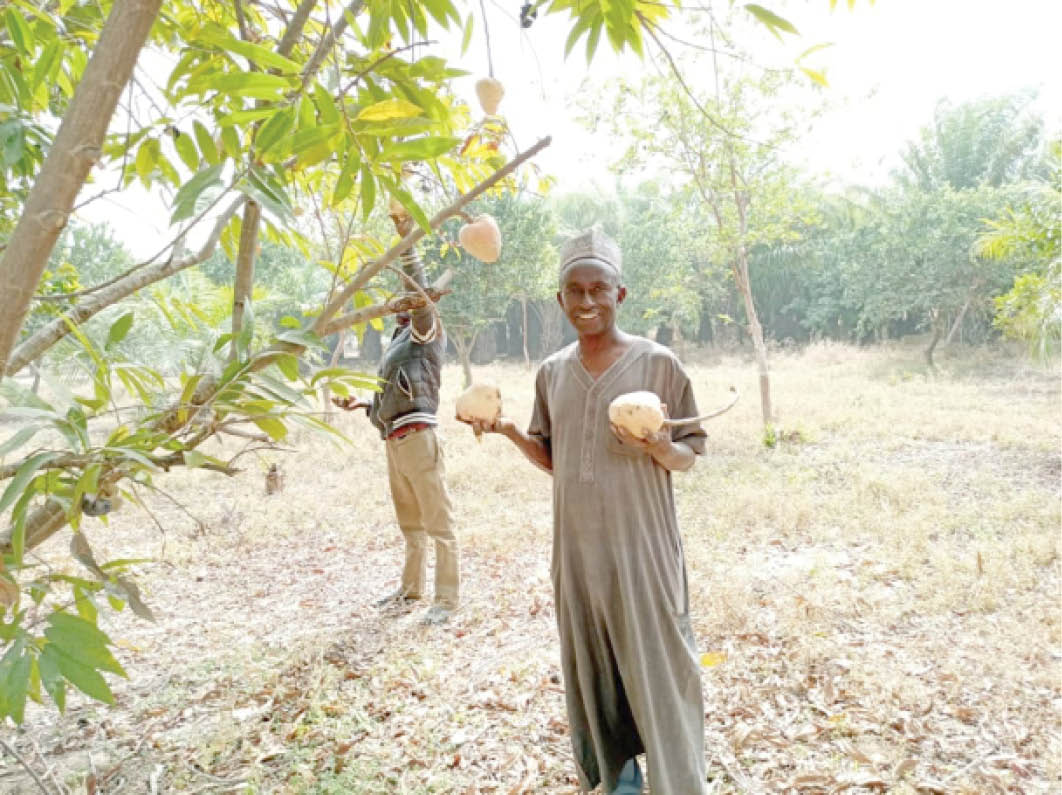I was provoked into earning millions in farming – Bauchi bizman
Mohammad Aminu Tukur has proven many people who think that certain crops cannot be grown in Bauchi State wrong and now makes millions of naira from his farm in Tafawa Balewa Local Government Area of Bauchi State. Alhaji Tukur shared with Daily Trust on Sunday how he was provoked into agriculture, saying he started at […]

Mohammad Aminu Tukur holds mongoes from his farm
Mohammad Aminu Tukur has proven many people who think that certain crops cannot be grown in Bauchi State wrong and now makes millions of naira from his farm in Tafawa Balewa Local Government Area of Bauchi State.
Alhaji Tukur shared with Daily Trust on Sunday how he was provoked into agriculture, saying he started at the age of 13 and now employs hundreds of youths in his community.
Tukur did not inherit farming as his father was an Islamic scholar teaching in a public school. Something dramatic, out of hunger, happened to the young Tukur that provoked him into farming. When his father was transferred from Zwall to Kangere, he (young Tukur) discovered that the family was starving.
He explained that, “In 1973, when we came to Zwall, during sweet potato harvest, we passed by somebody who was harvesting his potatoes and we asked him to help us with a little and he refused. So immediately when the rainy season came, on my own, I borrowed a hoe and did a very big ridge. I was 13 years. Then some people came to see it and said, ‘Look at this young boy, what motivated him?’ They didn’t know I was irritated by the fact that I was denied potatoes the previous year. I got potato vines and planted. So I became a potato farmer on my own; that was the starting point in 1974.
What he produces
Today, Alhaji Tukur produces virtually everything, from grains, tuber crops to other crops such as oil palm, oranges and sugarcane, and he has a processing factory where he processes brown sugar.
He is also into livestock farming where he has poultry, a fish pond and other exotic birds and animals in commercial quantities.
He said, “If you’re in need of exotic birds, I think we are second to nobody in Bauchi.”
Oil palm plantation: A jinx breaker
The most fascinating thing is that he produces oil palm in Bauchi, a state many believe oil palm cannot do well.
He explained that, “Our oil palm is doing well. It is unimaginable if you’re being told that oil palm can grow very well in Bauchi State. You will think that it’s a kind of joke; an expensive one for that matter, but the truth is that we started just by making an observation; whether it would grow, and by 2019, the little that we planted matured and we harvested 36 25-litre jerry cans from less than 300 trees.”
He said a tree produces up to 13 bunches and so he decided to invest more by planting more, and that in the next five years he would be able to produce not less than 200 jerry cans of palm oil, and eventually 1,000.
Mango, orange, apple, sugarcane
Alhaji Tukur’s farm is stocked with varieties of mangoes and oranges, but the most interesting thing has to do with orange, because “if you talk of orange, people will say it is from Benue State, but believe me, the oranges on the farm are sweeter and contain more juice compared to any kind of orange in Nigeria that I know of.”
However, apple is the only thing where the farm has recorded failure, and he explained thus: “I realised two things we failed to do: soil test before planting and temperature. But we have been told there are varieties that can do very well on the farm, and we will get that.”
The farm has a large sugarcane plantation and a processing plant that has the capacity of processing four trailers of sugarcane per day.
He said, “We’re doing it absolutely commercial, we process our own sugar and we process for others. Just brown sugar, and you know confessionary industries are in dire need of sugarcane juice.”
Besides all these, the farm is processing cassava into garri, and even this season he has not less than four hectares of cassava, in addition to yam, rice sorghum and maize.
Farm employs many youths
On employment, he said, “Apart from those people who are on our payroll monthly, whenever we’re processing sugarcane, we employ not less than 160 people.”
How the farm grows
Alhaji Tukur said, “We have been expanding at our own pace; meaning we have never been opportune to have anything that has to do with intervention from the local up to the federal government. For instance, if we invest N10,000 and we realise N50,000, the whole of N50,000 usually goes back to the farm, and so we have been progressing.”
